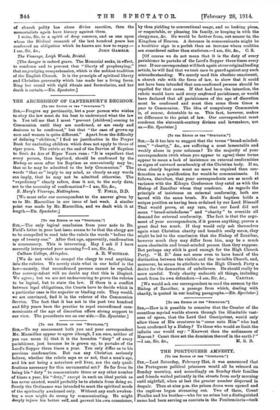[To Tat Emma or ma eBracrams...]
SIR,—To my amazement both you and your correspondent Mr. Macmillan appear to agree (though, I am sure, neither of you can mean it) that it is the bounden "duty" of every parishioner, just because he is grown up, to partake of the Lord's Supper three times a year. You only differ as to his previous confirmation. But can any Christian seriously believe, whether the rubric says so or not, that a man's age, and his not being a notorious evil liver, are the only quali- fications necessary for this sacramental act P So far from its being his " duty " to communicate three or any other number of times a year, his " duty," except in such an ideal pariah as has never existed, would probably be to abstain from doing so. Surely the Ordinance was intended to meet the spiritual needs of the spiritually awakened only. Without any slush awaken- ing a man might do wrong by communicating. He might deeply injure his better self, and pervert hie own conscience, by thus yielding to conventional usage, and so looking pions, or respectable, or pleasing his family, or keeping in with the clergyman, Sec. He would be further from, not nearer to, the Kingdom of Heaven. A decrease in communicants might be a healthier sign in a parish than an increase where realities are considered rather than statistics.-1 am, Sir, &a, C. S.
[Of course we do not mean that it is the duty of every parishioner to partake of the Lord's Supper three times every year. If ourcorreepondent will look again atouroriginalleading article, he Will find that we took care to guard against any such misunderstanding. We merely used this obsolete enactment, a church rale with the force of law, to show that it could not have been intended that non-confirmed persons should be repelled for that cause. If that had been the intention, the rubric would have said every confirmed parishioner, or would have declared that all parishioners of the age of discretion must be confirmed and must then come three times a year to Communion. The idea of compulsory Communion is, of course, detestable to us. This fact, however, makes no difference to the point of law. Our correspondent must condemn the sixteenth-century divines and lawmakers, not us.—En. Spectator.]














































 Previous page
Previous page